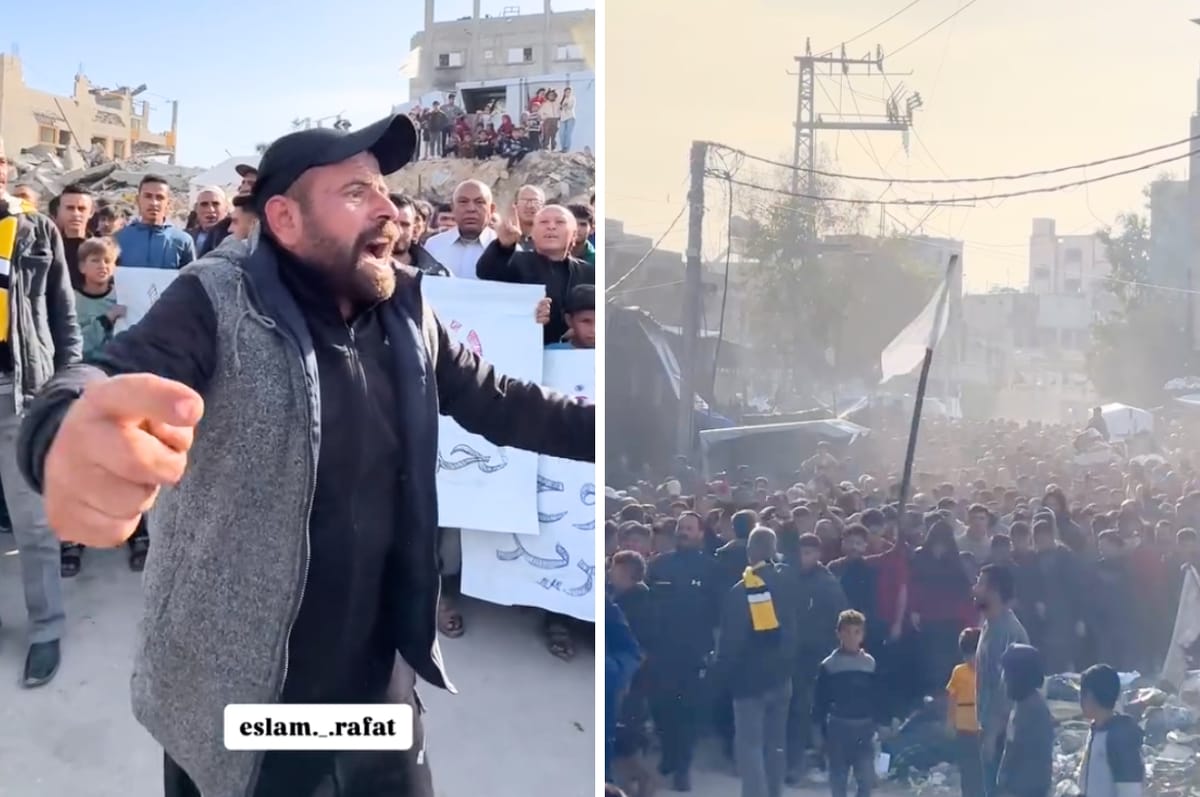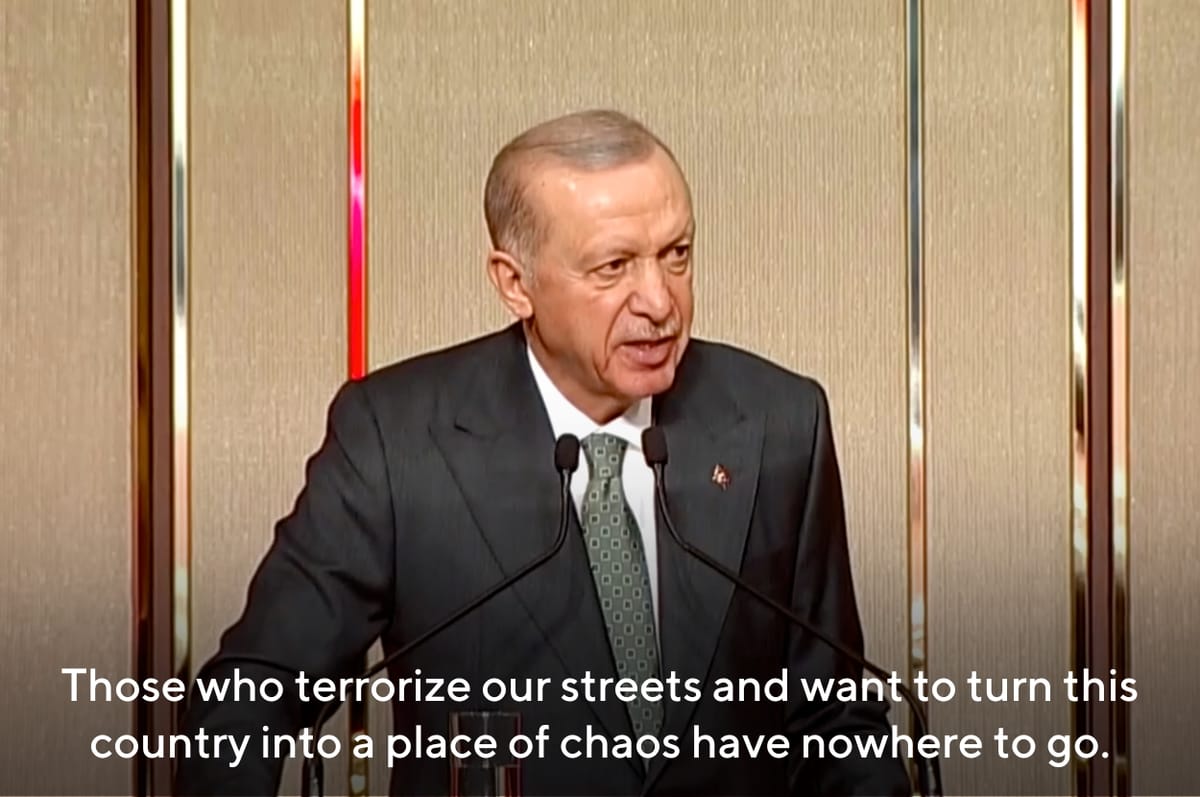Here’s What Happened Around The World In March 2025
Here’s what happened around the world in March 2025.

Here’s what happened around the world in March 2025.
1. Israel resumed its genocide in Gaza, killing over 400 people in under 24 hours
On Tuesday, March 18, at 2 am local time in Gaza, Israel launched “extensive airstrikes” across the Gaza Strip, including in Khan Younis, Rafah in southern Gaza, Gaza City in the north and central areas like Deir el-Balah, Al Jazeera reported.
Israel has refused to implement phase two of the ceasefire, which was supposed to begin on March 1, saying that Hamas must now accept a new US deal that would involve extending phase one of the ceasefire by 50 days and Hamas releasing all the Israeli hostages.
Israeli prime minister Benjamin Netanyahu’s office said in a statement that Israel will from now act with “increasing military strength” until Hamas releases all the remaining Israeli hostages.
2. People in Turkey are holding huge protests against the government arresting the main opposition leader
54-year-old Ekrem İmamoğlu is Istanbul’s mayor and main opposition candidate, he has been considered the leading rival to President Recep Tayyip Erdoğan, who has ruled for 22 years and has been accused of authoritarianism.
On Wednesday, March 18, police arrested İmamoğlu over “corruption and aiding a terrorist group”, detaining another 100 people as part of the investigation.
The arrest is part of months-long crackdown on opposition leaders across Turkey, according to Reuters.
Authorities then imposed a four-day ban on public gatherings and blocked access to several social media platforms, but thousands of people still took to the streets in protest.
3. A huge magnitude 7.7 earthquake hit Myanmar and was so strong it collapsed a building in Thailand and killed 2,000
A powerful magnitude 7.7 earthquake struck central Myanmar on Friday, March 28.
The earthquake severely damaged buildings, caused cracked roads and also led to the famous Ava bridge to collapse.
In Bangkok, the quake caused a 30-story building that was under construction to collapse, killing at least three people and trapping many others, according to AP.
A video on social media captured the moment the building collapsed in a cloud of dust as people screamed and ran.
4. Ukraine accepted a 30-day ceasefire after the US agreed to lift its pause on military aid
On Tuesday, March 11, US and Ukrainian officials met in Jeddah, Saudi Arabia, to discuss the minerals deal and a ceasefire deal to end the more than three years war.
The proposed 30-day ceasefire deal includes silence in the skies and at sea; safe transportation of shipping goods, releasing prisoners of war and military and civilian detainees; and returning Ukrainian children who were forcibly transferred to Russia, according to Zelenskyy.
Speaking on the same day, Trump told reporters that he thinks he will speak with Russian President Vladimir Putin “this week” and he hoped a ceasefire would be negotiated in the “coming days,” according to the New York Times.
“Ukraine is ready to accept this proposal—we see it as a positive step and are ready to take it. Now, it is up to the United States to convince Russia to do the same,” Zelenskyy said.
5. Over 300,000 people in Serbia held its biggest anti-government protest in history against corruption
The planned demonstration, known as “15 for 15,” capped more than four months of student-led protests against President Aleksandar Vučić and his Serbian Progressive Party.
The protests first began after a railway station roof collapsed in Novi Sad in November 2024, killing 15 people, aged between six and 74.
Students are demanding greater accountability and transparency over the disaster, calling for the government to implement the rule of law, end corruption and ensure government officials are held accountable for their actions.
"We just want a country that works," Jana Vasic, a law student at the protest, told the BBC. "We want institutions that do their jobs properly. We don't care what party is in power. But we need a country that works, not one where you don't get justice for more than four months."
6. US immigration kidnapped Mahmoud Khalil, a pro-palestine Columbia student and people want justice
Mahmoud Khalil was a graduate student at Columbia university in New York City and played a key role in the pro-Palestine students encampments.
He had been facing an intense doxxing campaign calling for his deportation, then he was then taken by US immigration despite being a legal permanent resident.
Trump said Khalil is linked to Hamas and that he is trying to deport him.
After his arrest, hundreds of people gathered outside outside the New York City Courthouse on March 12 to demand Khalil's release.
7. Celebrations erupted in Sudan after the army recaptured the capital after nearly two years of civil war
Since 2023, Sudan has been in a civil war due to a power struggle between the Sudanese military and RSF (Rapid Support Forces).
The RSF had taken control of nearly all of Khartoum, including government offices and the presidential palace when the civil war erupted.
On Wednesday, March 26, Sudan's military leader, Abdel Fattah al-Burhan said from the presidential palace, that Khartoum is “free” from the RSF.
Videos on social media showed al-Burhan walking through the presidential palace, surrounded by cheering troops.
Retaking Khartoum is seen as a major win for the army, but the war will most likely continue as the RSF still controls most of the Darfur region in western Sudan, the BBC reported.
8. Palestinians in Gaza were finally able to celebrate Ramadan despite their homes being destroyed to rubble
Ramadan is the holy month for Muslims, during which they fast every day from sunrise to sunset, refraining from eating and drinking.
Despite the destruction and the loss they endured for more than 16 months, Palestinians in Gaza are steadfast in enjoying the holy month of Ramadan.
On the first hours of Saturday, March 1, Palestinians had their first Suhoor this Ramadan.
Al Jazeera reported that people said this year’s Ramadan was more joyful because it came during a ceasefire, instead of under the constant fear of bombing like the last Ramadan in March 2024.
9. The Palestinian and Israeli directors who won best documentary at the Oscars gave a powerful speech
“No Other Land”, a Palestinian Israeli documentary showing Israel’s ethnic cleansing of Palestinians in the Israel-occupied West Bank, won the Oscar for Best Documentary Feature at the 97th Academy Awards on Sunday, March 3.
The film, shot over four years between 2019 and 2023 was co-directed by Basel Adra, Hamdan Ballal, Yuval Abraham and Rachel Szor, a collective of four Israeli and Palestinian activists, in what they say is an act of resistance on the path to justice for Palestinians and Israelis.
While accepting the award on Sunday, Adra and Abraham delivered a powerful speech together, jointly calling for an end to Israel’s ethnic cleansing of Palestine.
“About two months ago, I became a father, and my hope to my daughter that she will not have to live the same life I’m living now, always fearing settlers, violence, home demolitions and forcible displacements that my community is living and tasting every day under Israeli occupation,” Adra said.
“When I look at Basel, I see my brother. But we are unequal. We live in a regime where I am free under civilian law and Basel is under military laws that destroy his life,” Abraham said, while calling for an end to Israel’s “atrocious destruction” in Gaza and for the Israeli hostages to be freed.
10. Trump ordered massive airstrikes on Yemen, killing over 30 people, including women and children
The US attacks, which are most significant military action since US President Donald Trump’s return to office in January, came days after the Houthis announced it is resuming attacks on Israeli ships due to Israel blocking all aid deliveries to Gaza.
Houthis had been targeting Israeli ships to support Palestinians in Gaza and to pressure Israel to end its genocide, which has killed more than 48,000 Palestinians, mostly women and children.
The US then began launching airstrikes on the evening of Saturday, March 15, hitting Yemen's capital, Sanaa, as well as areas in Saada and al-Bayda.
At least 32 people were killed and 101 others were injured as over 40 airstrikes continued into the early hours of Sunday, according to Yemen's ministry of health, Al Jazeera reported.
11. On the 14th anniversary of the Syrian revolution, the Syrian army dropped flowers instead of bombs
On Sunday, March 15, dozens of people gathered in Umayyad Square in the capital, Damascus, to celebrate the anniversary of the 2011 Revolution for the first time, and instead of the barrels of bombs that used to be dropped on civilians by former President Bashar al-Assad’s regime, the new government dropped flowers and messages of peace and unity.
The civil war lasted more than 13 years until rebel forces led by current president Ahmed al-Sharaa’s Hayat Tahrir Al-sham (HTS) toppled the Assad regime in a 12-day lightning offensive.
On the anniversary, people took to the streets in celebration, singing revolutionary songs and holding the new Syrian flag.
12. Hungarian lawmakers lit rainbow smoke bombs to protest the far-right government banning LGBTQ pride
The official ban comes after the Hungarian government under far-right prime minister Viktor Orbán told Budapest Pride organizers in February that the parade “will not take place in a public form” this year as part of a move to “protect” children, according to Politico.
On Tuesday, March 18, the parliament passed a law that removes the people’s right to assemble if they violate a 2021 law that bans LGBTQ content for children.
After the law was approved, opposition lawmakers set off colorful smoke bombs to form a rainbow inside the chamber in protest.
Meanwhile, thousands of people gathered outside the parliament to protest the government’s move, eventually blocking a bridge in central Budapest.
Pride organisers said they will continue to plan for this year’s parade, which has been held annually in the capital Budapest.
13. Israel killed beloved 23-year-old journalist Hossam Shabat in Gaza hours after killing another journalist
Israel has killed 23-year-old Palestinian journalist Hossam Shabat in north Gaza, just hours after it killed another journalist, Mohammad Mansour, in southern Gaza.
Despite Shabat's house being bombed at the beginning of the war and Israel killing more than 100 of his friends and family, Shabat has been injured before but insisted on continuing to report, according to Al Jazeera.
Gaza’s Media Office condemned Israel’s “systematic attacks” against journalists, holding Israel and its allies responsible.
Israel has now killed 208 journalists in Gaza since Oct. 7, 2023, according to the office.
14. In a landmark moment, the Syrian government merged Kurdish-led forces into the country’s system
The SDF is a Kurdish-dominated, US-backed group that controls significant parts of northeastern Syria.
The Syrian Presidency announced on Monday, March 10, that President Ahmed Al-Sharaa had signed an agreement with the head of SDF, Mazloum Abdi, to integrate the SDF into all of the Syrian state’s military and civilian entities, including border checkpoints, airports and oil and gas resources.
The Kurdish population will be recognized as a vital part of Syria and Kurds who were previously denied citizenship will become citizens.
The agreement also includes a halt in fighting on all Syrian territories and the SDF would assist the new government in fighting against pro-Assad fighters.
Celebrations erupted in various Syrian cities following the announcement of the agreement, with people hopeful for a united and stable future for Syria.
15. This South Korean actress who killed herself was revealed to have dated a top actor when she was 15 and he was 27
24-year-old Kim Sae-ron was found dead in her home in Seoul on Sunday, Feb. 16, with police ruling her death as a suicide.
Kim’s aunt said that Sae-ron had been in a secret relationship with actor Kim Soo-hyun, one of South Korea's highest paid actors, for six years, starting from when she was 15 and Soo-hyun was 27.
Before her death, Sae-ron was struggling to repay a nearly 700 million Korean won (approximately US$482,000) in debt to her agency as a result of her DUI.
Her agency, which was co-founded by Soo-hyun's relative, had covered the damages, but in 2024, asked her to repay the full amount immediately, which led her to reachout to Soo-hyun for help.
People have pointed out how Korean media was quick to call out Sae-ron for her drunk driving incident, while Soo-hyun, who is now facing allegations of pedophilia and grooming, has not faced nearly the same level of backlash from local media.
16. Syria was rocked by its worst violence since it was freed, with over 1,000 people killed in two days
The clashes first began after gunmen loyal to Bashar al-Assad ambushed government security forces when they were conducting an operation in the coastal region of Latakia on Thursday, March 6, according to Al Jazeera.
The pro-Assad fighters attacked security patrols and checkpoints in the Jableh area, killing at least 15 security personnel, a Syrian security office told Al Jazeera Arabic.
The Syrian Observatory for Human Rights said on Sunday, March 9 that 1018 people had been killed, including 745 civilians, 125 members of government forces and 148 gunmen affiliated to the former regime's army.
Al-Sharaa vowed to hold accountable those responsible for the deaths of government security personnel and called on security forces not to use force on civilians.
17. Arab leaders rejected Trump's plan to ethnically cleanse Palestinians and put forward their own plan for Gaza's future
On March 4, Arab leaders agreed to a plan by Egypt to reconstruct Gaza during an Extraordinary Arab Summit in Cairo.
Leaders, including those of Palestine, rejected US President Donald Trump’s proposal to ethnically cleanse Gaza by mass expelling Palestinians and instead adopted Egypt's 112-page reconstruction plan for Gaza.
Countries that approved Egypt’s plan included Egypt, Saudi Arabia, United Arab Emirates, Kuwait, Bahrain, Qatar, Oman, Jordan, Syria, Lebanon, Iraq, Yemen, Libya, Sudan, Morocco, Mauritania, Djibouti and Comoros.
Egypt’s plan consists of 3 stages: Recovery, Reconstruction, Governance
18. Trump deported over 200 Venezuelans who are allegedly gang members to El Salvador’s mega prison
The deportation comes after El Salvador’s President, Nayib Bukele, offered to take in criminals and migrants deported by the US and jail them in its notorious mega-prison, CECOT.
On Friday March 15, Trump signed an executive order invoking a wartime law to deport Venezuelans allegedly linked to the Venezuelan gang, Tren de Aragua.
On Sunday, March 16, Bukele shared on social media that El Salvador received 238 alleged members Tren de Aragua, along with 23 alleged members of the Salvadoran gang, MS-13.
The head of Venezuela’s parliament said that the people deported were not known to have committed any crimes in the US or in El Salvador, and the country would do everything it can to return them home, Reuters reported.
19. Pope Francis finally left the hospital after five weeks of being treated for double pneumonia
88-year-old Pope Francis made his first public appearance, greeting hundreds of supporters from the balcony of Rome's Gemelli Hospital, where he had been receiving treatment since Feb. 14.
Despite being in the hospital, the Pope still made his daily phone calls to Gaza's only Catholic parish, as he had done every evening since Oct. 9, 2023, two days after Israel began its genocide in Gaza, the Vatican News reported.
Following his discharge, he returned to the Vatican's Casa Santa Marta residence to continue his recovery, which is expected to last at least two months.
You Might Also Be Interested In











